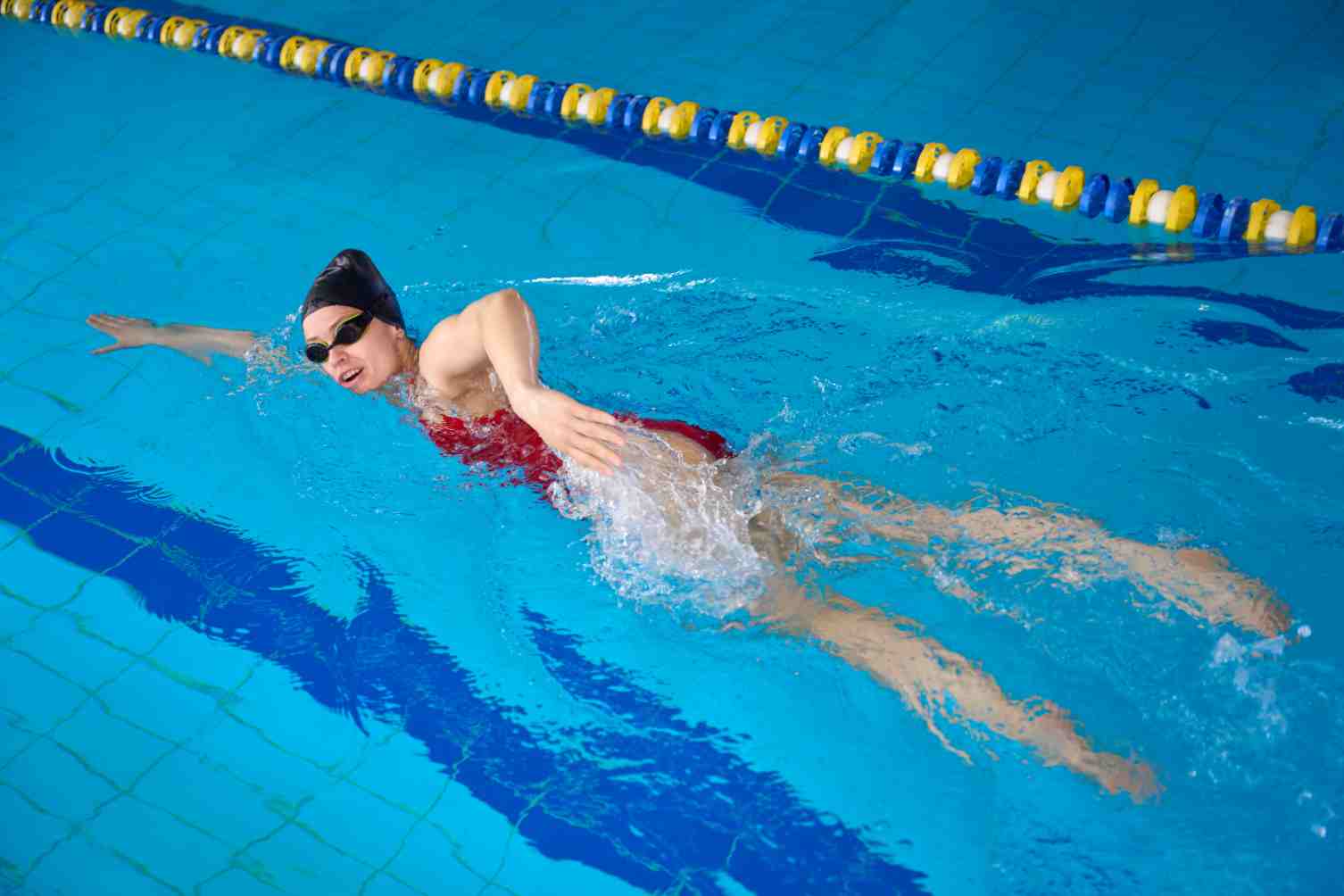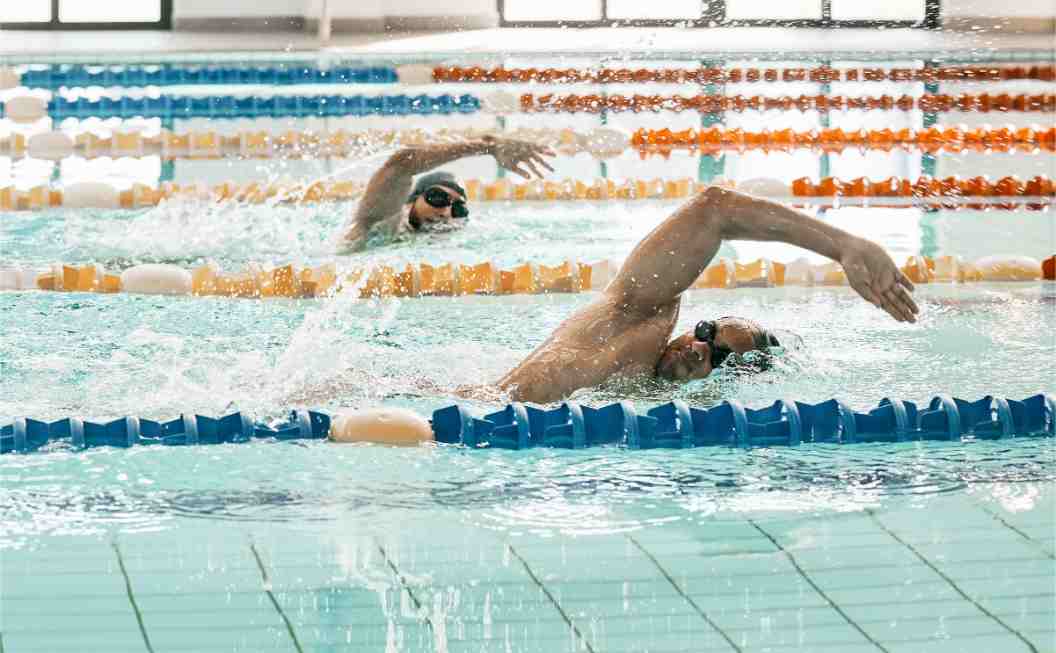Running vs Swimming: Which is More Beneficial for Your Fitness?

Running and swimming are great cardiovascular exercises that help burn calories and improve cardio fitness. For example, swimming improves your heart rate, increases the strength of your lower and upper body muscles, and tones them as well. At the same time, running helps to tone your lower body, prevents bone loss, and burns calories.
However, if you are not convinced about their benefits and are confused about which is better for promoting overall fitness, keep reading this article about 'running vs. swimming' to learn more.

Table of Contents

What is Running?
Running is the activity of moving quickly forward while on foot. This differs from walking, which always has one foot on the ground. However, running comes to a point when both feet are off the ground. Because of this, running is a high-impact activity.
Running can be anaerobic, aerobic, or a combination of the two types of exercise, depending on what kind of running you're performing. There are two forms of cardiovascular exercise: anaerobic and aerobic. Anaerobic exercise entails brief bursts of energy spent at your maximum effort for a short time. In contrast, aerobic exercise involves a sustained increase in heart rate and oxygen intake.
What is Swimming?
Swimming propels the body through water, requiring coordination of arm and leg movements. It requires much work to overcome the water's natural resistance, and it will improve your muscles. During a total-body workout, the majority of your muscles are used, which can increase muscle strength.
People swim for various reasons; it can be a fun activity or something they must do for work or other obligations. Swimming can also be used to recover from injuries, particularly muscle and cardiovascular ailments. Swimming is another sport or job option. Some talented people might decide to compete professionally.
Running vs Swimming: Key Differences
Both swimming and running are effective ways to maintain a healthy body. However, there are some differences between these two. Knowing them will help you ascertain which exercise is suitable for you.
So, without any further delay, let's go through the differences between running and swimming mentioned in the table below:
Which Muscles are Involved During Running & Swimming?

Here is a list of muscles that are involved in running and swimming, each generating propulsion, maintaining stability, and controlling movement mechanics unique to each activity:
Quadriceps (Quads)
During running, the quads contract concentrically to extend the knee and propel the body forward with each stride. In contrast, swimming involves less direct use of the quadriceps for propulsion since the legs mainly assist in maintaining body position and balance in the water.
Hamstrings
Running places significant stress on the hamstrings, particularly during the eccentric phase, when they lengthen to decelerate the leg. In swimming, the hamstrings also help stabilize the legs and assist in kicking motions, especially in strokes like freestyle and backstroke.
Calves (Gastrocnemius and Soleus)
During running, they contract to plantarflex the ankle, pushing the body off the ground and aiding in forward movement. In swimming, the calves assist in pointing the toes during kicking movements, enhancing propulsion and streamlining in the water.
Gluteal Muscles (Glutes)
During running, the glutes work dynamically to extend the hip joint and propel the body forward with each stride. In swimming, the glutes assist in maintaining a streamlined body position and contribute to the propulsion phase during strokes like freestyle and butterfly.
Latissimus Dorsi (Lats)
The latissimus dorsi muscles are primarily involved in swimming, playing a key role in the pulling motion during some strokes. While running does not directly engage the lats to the same extent, maintaining strong and flexible lat muscles can still benefit overall posture.
Deltoid Muscles (Delts)
In running, the deltoids contribute to arm swing and balance, helping to maintain efficient running mechanics and upper body posture. In swimming, the deltoids are crucial for generating propulsion during the arm strokes of various swimming styles.
Pectoral Muscles (Pecs)
In running, the pecs assist in maintaining arm swing and upper body stability, contributing to efficient running mechanics and overall posture. In swimming, the pectoral muscles are essential for generating propulsion during the arm movements of strokes such as freestyle and butterfly.
Core Muscles
A strong core helps maintain proper posture and alignment during running, reducing the risk of injuries such as lower back pain. In swimming, the core muscles are crucial in maintaining a streamlined body position and stabilising the torso during arm and leg movements.
Which is Better - Running or Swimming?
Swimming is comparatively better as a cardiovascular exercise than running because resistance in water is higher than in air. Therefore, you need to make more effort to do swimming than you put in while running.
However, if you must choose between the two, it completely depends on your preference, lifestyle, and health condition.
For example, if you suffer from joint pain, you must practise swimming instead of running. Swimming will put less stress and will not increase joint issues. On the other hand, if you want to improve your bone health, running is a better option. Similarly, you need to assess your other health conditions, like injury, before exercising.
Benefits of Running

Running daily is beneficial for overall fitness and strength improvement. Listed below are the benefits of running:
As mentioned earlier, running is a weight-bearing exercise that increases bone density and prevents bone loss.
Unlike swimming, it is easy to get started with running. All you need to do is head outdoors or run on treadmills indoors.
It helps to strengthen your overall musculoskeletal systems, such as hamstrings and quads.
Improves heart health and decreases the risk of developing severe diseases such as high blood pressure and diabetes.
Benefits of Swimming

Swimming for both recreation and fitness is beneficial for a healthy mind and body. Mentioned below are the benefits of swimming:
Swimming is an excellent exercise to treat rheumatoid arthritis, osteoarthritis, and other conditions that lead to joint pain.
This exercise is safer for you in case you are recovering from injuries. This is because the buoyancy in water backs your joints and muscles and helps you work out harder by lowering your body's stress.
Swimming engages multiple muscles in your body, providing a full-body workout.
It boosts heart rate and builds muscle strength.
Swimming increases flexibility in the body and improves posture, balance and coordination.
Is it Safe to Indulge in Both Running and Swimming?
Yes. Swimming is an excellent exercise to complement your running schedule. Your swimming session should follow your long-running schedule as swimming will help you to recover from the tiredness you got from running extra miles.
Besides, swimming requires full-body movements, further strengthening muscles not used while running. This reduces muscle imbalances and protects you from injury. Furthermore, swimming trains you to regulate your breath during any effort. This is extremely helpful when you have to race outside under challenging conditions.
And while combining both activities enhances your overall fitness, protecting your health journey with comprehensive health insurance is equally important. Many insurers now offer wellness-linked benefits or coverage for sports-related injuries and physiotherapy, ensuring you're financially supported while staying active.
How Much Swimming and Running is Suitable for a Week?
You should swim four to five days a week to get the best results for losing weight. Initially, begin swimming for 15 to 20 minutes and then slowly, once your body allows it, increase the timing to 30 minutes for five days a week. If you begin swimming at a high intensity, you may experience fatigue and muscle soreness, ultimately leading you to give up.
In the case of running, you should run 30 minutes a day or 2.5 hours a day per week, which must be continued for five days a week to enjoy long-term health benefits, according to a group of Dutch researchers.
Who Should Avoid Running and Swimming?
Running and swimming are generally considered safe and beneficial exercise for most people. However, certain individuals may need to exercise caution or avoid these activities altogether based on specific health conditions or circumstances:
- Joint Problems: People with severe joint pain, osteoarthritis, or rheumatoid arthritis may find high-impact activities like running uncomfortable. However, with its low-impact nature, swimming may be a more suitable alternative as it provides cardiovascular benefits without straining the joints.
- Heart Conditions: Individuals with certain heart conditions, such as severe coronary artery disease, recent heart attack, or uncontrolled high blood pressure, should consult with their healthcare provider before starting a running or swimming regimen. Both activities can increase heart rate and blood pressure.
- Respiratory Issues: People with severe asthma or chronic obstructive pulmonary disease (COPD) may find running challenging due to the increased demand for oxygen and potential triggers like cold air or allergens. Swimming in a properly maintained indoor pool with good air quality can be a better option.
- Pregnancy: While many pregnant women can continue running and swimming during pregnancy, consulting with a healthcare provider is essential. Swimming, especially, is often recommended as it is gentle on the joints and provides buoyancy that can alleviate some of the discomforts of pregnancy.
- Recent Injuries or Surgery: Individuals recovering from recent injuries or surgeries, particularly those involving joints, muscles, or bones, should follow medical advice regarding when and how to resume running or swimming safely. With its low-impact nature, swimming can sometimes be incorporated earlier during rehabilitation.
- Balance Issues: People with balance problems or a high risk of falls may need to be cautious with activities like running, which involve rapid changes in body position and direction. Swimming, which provides support from the water and reduces the risk of impact-related injuries, may be a safer alternative to improve cardiovascular fitness.
- Severe Obesity: While both running and swimming can be beneficial for weight management, individuals with severe obesity may find running uncomfortable due to excess weight impacting joints. Swimming, being low-impact and supportive, can be a more comfortable and effective option for weight.
Myths vs Facts about Running

Running is a common activity among most people. However, there are a few myths surrounding running as an activity:
Myths vs Facts about Swimming

Swimming is a beneficial sport and activity. But it has many misconceptions surrounding it. Here are a few:
Hopefully, this guide about running vs swimming has cleared up all your confusion. If you still have any doubts and also suffer from any existing health condition, consult a healthcare expert before starting any new exercise to avoid any health issues later.














